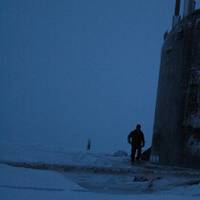Climate Change Link to Extreme Weather Easier to Gauge - U.S. report
Scientists are better able to measure how climate change may cause extreme weather such as droughts, heat waves and heavy rain, but research does not clearly tie wildfires, tornadoes and hurricanes to global warming, the top U.S. scientific organization said on Friday. The National Academies of Sciences, Engineering and Medicine said in a 144-page report that a host of factors could be behind weather events, including normal variations and atmospheric circulation. Extreme events are harder to explain, since they are rare and data are limited, said the honorary group chartered by Congress to perform studies for the federal government.
U.S. Navy Pursues Better Weather Forecasting
Navy Researchers Seek to Improve Weather Prediction for Global Operations. With the Atlantic hurricane season officially beginning this month, the Office of Naval Research (ONR) is pursuing a number of projects to help Navy forecasters and meteorologists around the world predict storms better. ONR's efforts in funding ocean research are yielding enhanced weather and ocean prediction models-highlighted in a new video-that help Navy leaders understand how to route ships around the globe to avoid storms, reduce fuel consumption, avoid Arctic ice flows and promote safety at sea. "Weather is one of the most significant factors affecting naval operations at sea," said Chief of Naval Research Rear Adm. Matthew Klunder.
Navy Completes Arctic Environmental Assessment
WASHINGTON (NNS) -- The Navy released an Arctic environmental assessment and outlook Aug. 15 that will be instrumental in developing future strategic plans and investments in a region that is becoming increasingly accessible to exploration and commercial enterprise. "In the past the Arctic was largely inaccessible, but increased seasonal melting of the sea ice is opening the region and creating opportunities for oil and gas exploration, maritime shipping, commercial fishing, and tourism," said Rear Adm. David Titley, director of the Navy's Task Force Climate Change. The assessment notes that the U.S. has close to a thousand miles of Arctic coastline in Alaska and significant coastal waters for resource exploitation. "With Alaska's coastline, the U.S.
Oceanographer of the Navy on Climate Change

The oceanographer of the Navy and director of the U.S. Navy's Task Force Climate Change discussed the national security implications of the changing global climate at the United Nations climate change summit in Copenhagen Dec. 16. Formally known as the United Nations Framework Convention on Climate Change (UNFCCC) Conference of Parties 15 (COP-15), the summit, according to a statement on the convention's website, brings together negotiators, ministers, and world leaders as part of a unified international effort to combat climate change. "The U.S.
Navy Charts Way Ahead in Arctic
The chief of naval operations created a task force, headed by the Navy's senior oceanographer, to better understand and evaluate the changing climate and its implications for maritime security. "Task Force Climate Change was initiated ... to assess the Navy's preparedness to respond to emerging requirements and to develop a science-based time line for future Navy actions regarding climate change," explained Rear Adm. "Because the Arctic is changing faster than any other place on the planet, our first deliverable will be a strategic roadmap proposing actions for the Navy regarding the Arctic region," Titley said. This may include an assessment of how the maritime strategy applies to the Arctic region…
Navy Discusses Arctic Changes
The oceanographer of the Navy and commander of the Naval Meteorology and Oceanography Command (NMOC) recently discussed the Navy's future in the Arctic at the third Symposium on the Impacts of an Ice-Diminishing Arctic on Naval and Maritime Operations at the U.S. Naval Academy. Rear Adm. David Titley spoke about the Arctic and is scheduled to deliver a "roadmap" for Navy action regarding the Arctic late this summer. Titley's task came out of a Chief of Naval Operations Executive Board (CEB) meeting on the Navy's response to the changing environment and a new national Arctic policy. "My first deliverable, a Navy Arctic roadmap, is a way to get a handle on the Arctic and climate change in general," Titley said. In 2007, the summer sea ice minimum in the Arctic reached a record low.
Titley New Oceanographer of the Navy
In a ceremony at the U.S. Naval Observatory, Rear Adm. David Titley assumed the office of oceanographer of the Navy, replacing retiring Rear Adm. David A. Gove. Titley will simultaneously maintain his current position as commander of the Naval Meteorology and Oceanography Command until a replacement can be found. Headquartered at the U.S. Naval Observatory, the oceanographer of the Navy serves as the advisor to the chief of naval operations for resources, requirements, and policy with regard to the Naval Oceanography Program. The program, which includes the disciplines of oceanography, hydrography, meteorology, geospatial information and services…







